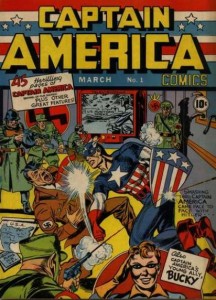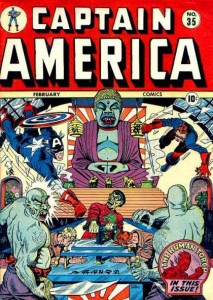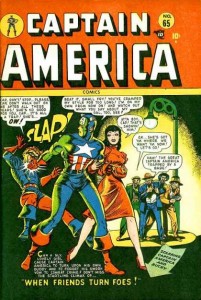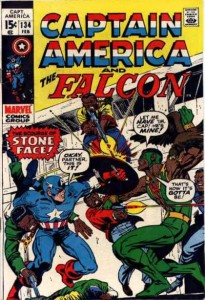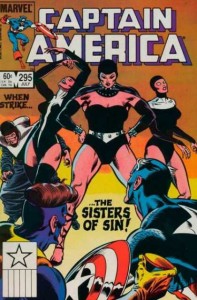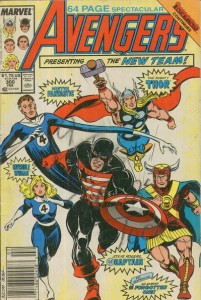Jason Dittmer recently published the book Captain America and the Nationalist Superhero: Metaphors, Narratives, and Geopolitics. I wrote a review (titled “Captain Nowhere”) at Reason Magazine. Jason had an interesting reply which was buried at the end of a long comments thread, and which I thought it might be worth highlighting here. Jason kindly agreed — and his response to my review is therefore reprinted below.
Hello all,
I would like to thank Noah Berlatsky for his review, which although critical raises some interesting points. I especially like some of the debate that it has spawned in the comments thread, especially on the relationship between states and markets. However, I do feel like a bit of an injustice has been done to the arguments of my book and I would like the chance to respond.
First, Berlatsky argues that I have ignored the two main reasons for studying popular culture, both of which revolve around the idea of relevance. Either something is worth studying because it is aesthetically important, or because it is ‘sociologically relevant’ (meaning vastly popular). The former is, of course, a matter of taste and therefore inserts an elitism into the analysis (we should only study GOOD popular culture) and the latter relies on the notion that audiences will be shaped by the popular culture in question (hence the importance of the audience size). Berlatsky implicitly adopts the latter perspective in his argument that I should be paying attention to the Captain America movie rather than to comics, which have a relatively small audience. I reject both of these arguments. Or rather, I think that to limit ourselves to them is to misunderstand the reasons it is worthwhile to study popular culture.
Rather than relying on relevance, I have studied comic books because of the way in which they come into the world — month after month, year after year. They provide an archive of insights into how artists and writers try to reconcile past events and (then) present concerns into a continuous narrative (there is, of course, a great concern with ‘continuity’ in superhero universes). In truth, I am interested in popular culture not as a thing which can be ‘relevant’ or not, but as a process — a continual set of interactions between creative teams, editorial staff, fans who write letters in to the creative team, and broader market forces. I am sorry if Berlatsky finds my examples ‘comically banal’ but I think that is because he doesn’t see why they are important. He sees them as ‘long-forgotten'(and therefore fundamentally irrelevant) but I see them as negotiations among people trying to assemble a world of collective meaning. Many of the commenters here, based on Berlatsky’s review, seem to think that what I am offering is a crude cultural analysis straight out of the Frankfurt School. I contend this is not the case, and that my argument is far different from the synopsis given here.
Fundamentally, my book is about two different kinds of geography (a word that never appears in Berlatsky’s review despite its fundamental importance to the book).
First, it is about the geography of the nation-state, and the way in which this is reproduced as a fundamental spatial category in our political life. Berlatsky scores rhetorical points in his review by asserting that I am somehow unaware of the politics that occurs outside or beyond the nation-state framework. I think this shows how fundamentally he misunderstands what I am doing in this book.
The book is, rather, about the way in which the nation-state is continually reproduced as a discourse of the political, and therefore also about the reduction of politics to that which is addressed by the state. My chapters each center on some aspect of this: the narration of a coherent body politic, of territory, of geopolitical orders, and so on. I am not holding up the state as an ideal, rather I am asking why so many people ascribe such meaning to it – a perspective I think Berlatsky would agree with given the conclusion to his review.
The second geography on tap in this book is found in the way the idea of the nationalist superhero genre is changed as it shifts from the U.S. context (in which it was created) to Canada and the UK. Again, this is about studying process rather than finding out how, for example, Canadian nationalist superheroes are different in the sense of cultural analysis. Berlatsky does not really touch on this aspect of my book.
I have gone on long enough and I do not want to wear out my welcome. I also do not want to come across as angry at Berlatsky — perhaps his misconceptions about my book are the result of my poor writing, or indeed maybe it is as laughable as he makes it out to be. But I wanted to a chance to make the case for the book, especially as Reason is such an interesting and important venue for the book to be reviewed. Thank you!


